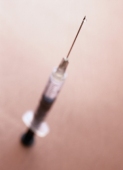 |
 |
 |

Half-Dose Flu Shot Works Well in Young Adults
The finding could greatly expand the supply of the seasonal vaccine, experts say|
|
HealthDay
By Robert Preidt
Monday, December 8, 2008
 MONDAY, Dec. 8 (HealthDay News) -- A half-dose flu shot is sufficient to trigger an immune response in healthy adults younger than age 50 who've had prior flu vaccinations, U.S. researchers report.
MONDAY, Dec. 8 (HealthDay News) -- A half-dose flu shot is sufficient to trigger an immune response in healthy adults younger than age 50 who've had prior flu vaccinations, U.S. researchers report.
The finding suggests that using half-doses in healthy young people may be a way of coping with vaccine shortages.
"Since 2002, optimum influenza vaccine delivery has been impaired as a result of supply shortages. With the abrupt loss of half the anticipated national influenza vaccine supply in October 2004, the option of using a reduced dose for immunization of healthy, high-priority groups became a critical consideration," Dr. Renata J.M. Engler, of Walter Reed Army Medical Center and colleagues wrote as background information in their study.
In a study involving healthy adults, aged 18 to 64, who'd been vaccinated within the past one to three years, Engler and colleagues gave a full-dose flu shot to 554 participants and a half-dose shot to 556 participants. Blood samples taken before and 21 days after vaccination were tested for antibodies against influenza and the volunteers reported any flu-like symptoms they experienced during this time period.
"Antibody responses to intramuscular half-dose trivalent inactivated influenza vaccine in healthy, previously immunized adults were not substantially inferior to the full-dose vaccine, particularly for ages 18 to 49 years," the researchers wrote.
The participants were given their flu shots between November and December 2004. Those who received the half-dose shot had no more medical visits for respiratory or cardiovascular reasons than those who received the full-dose flu shot.
The study is published in the Dec. 8/22 issue of the Archives of Internal Medicine.
"Given the benefits of immunizing healthy working adults and caregivers, these data support the validity of a dose reduction strategy in the setting of vaccine shortages," the researchers wrote. "Reduced dosing could have a significant impact on the response to vaccine shortages, particularly at a local level when faced with considerable delays in vaccine supply delivery."
Engler and colleagues also found that women of all ages had a greater immune response to both doses of the flu vaccine than men. Women who received the half dose had similar antibody responses as men who received the full dose.
"These findings suggest that guidelines for vaccine use during shortages should take sex, as well as age, into consideration. As recommendations for influenza expand and evidence that elderly persons [men older than 60 years] may require higher doses of vaccine for optimal responses, reduced doses in healthy, younger populations may become a valuable national strategy," the study authors concluded.
Instead of trying to find ways to stretch vaccine supplies, better methods of flu vaccine production are needed, Dr. Ann R. Falsey, of Rochester General Hospital, N.Y., said in an accompanying editorial.
"Although the results of this study are useful and can provide a guide to extending the vaccine supply during periods of shortage, perhaps the real message of this study is that better methods of influenza vaccine production that are less prone to problems are clearly needed," she wrote.
HealthDay
Copyright (c) 2008 ScoutNews, LLC. All rights reserved.
Related News:
More News on this Date
Related MedlinePlus Pages:
| Home | Health Topics | Drugs & Supplements | Encyclopedia | Dictionary | News | Directories | Other Resources | |
| Disclaimers | Copyright | Privacy | Accessibility | Quality Guidelines U.S. National Library of Medicine, 8600 Rockville Pike, Bethesda, MD 20894 National Institutes of Health | Department of Health & Human Services |
Date last updated: 09 December 2008 |




